Support us from £3/month
We deal with almost 1000 cases a year assisting communities, groups and individuals in protecting their local spaces and paths in all parts of England and Wales. Can you help us by joining as a member?
Whatever we may feel about leaving the EU it does provide a chance to rethink our agricultural-support systems, and to devise a scheme which favours public access, writes our general secretary, Kate Ashbrook.
Lord Gardiner, in his reply to our letter to the Prime Minister, said: ‘We will be looking to develop a new approach to supporting agriculture and protecting our precious countryside including issues around cross compliance on rights of way’. We want to help him.
The EU pays British farmers up to £3 billion a year, of which £600 million (20 per cent) is for environmental protection. Of course this is all public money which should pay for public goods. Various amenity groups have piled in with their proposals for low-intensity farming and habitat and countryside protection—but what about public access?
Ring fenced
In the new regime, we argue that there must be payments for access which are ring fenced (the government claims not to like ring fencing, but the post-Brexit world will have new rules).
These payments should be available to landowners who offer new, useful, freedoms—whether on paths or access land. Ideally this will be permanent, consisting of definitive rights of way, or land dedicated for access under section 16 of the Countryside and Rights of Way Act 2000 or as a village green.
Payments should also be made to improve existing access: farmers could pledge to mow headland routes, leave cross-field paths uncultivated, or provide new access points on open country.
Any farmer receiving grant whose public paths are not kept in good order, or whose access land is inaccessible, will have payments deducted. The money will be returned to the national access pot for use elsewhere.
Currently, although there are cross-compliance rules for public rights of way (see Defra’s Good Agricultural and Environmental Conditions page 23), it is difficult to get anything done. You can report the breach to the Rural Payments Agency for use when it carries out one of its vanishingly rare inspections. But if a path has not been reinstated after ploughing it will almost certainly not be seen in time—a useless instrument.
Power to dock grants must therefore be transferred to highway authorities who must visit reported sites at once. And no longer should the rules apply only to ‘visible’ paths, an absurd limitation.
Some of the access pot could be used to ensure that highway authorities have sufficient staff to carry out the necessary checks; this will give value for money because it will encourage farmers to keep paths clear which will in turn reduce the local authorities’ burden.
If ‘Brexit means Brexit’, Prime Minister, ‘Access means Access.’


